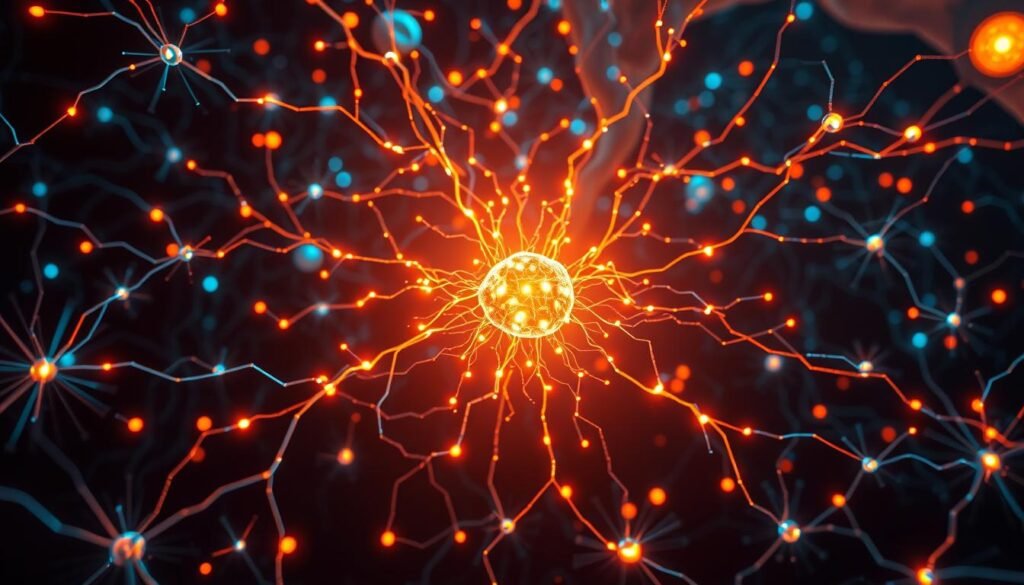Can we change how we handle stress with certain foods and exercises? The idea of neuroplasticity shows our cognitive health can adapt more than we thought.
Studies show that some foods and exercises can boost our brain’s resilience against stress. By using neuroplasticity, we can change how we react to stress. This could lead to better overall health.
Key Takeaways
- Understanding neuroplasticity is key to managing stress.
- Choosing the right foods can improve cognitive health.
- Exercises can make our brain’s resilience stronger.
- Mixing diet and exercise can help manage stress better.
- These habits can bring long-term health benefits.
Understanding Neuroplasticity and Its Importance
Neuroplasticity is the brain’s ability to make new connections. It’s key for learning, adapting, and healing. It keeps our brain healthy and flexible.
What is Neuroplasticity?
Neuroplasticity means our brains can change and adapt with age. It shows our brains aren’t fixed, but can grow and change. This is how we learn and remember things.
There are a few ways neuroplasticity works:
- Synaptic plasticity: This is when connections between neurons get stronger or weaker.
- Neurogenesis: This is when new neurons grow in the brain.
- Functional plasticity: This is when different parts of the brain start working together in new ways.
How Neuroplasticity Affects Resilience
Resilience is about bouncing back from tough times. It’s linked to neuroplasticity. When we face stress or trauma, our brains change. Neuroplasticity helps us rewire our brains to handle future challenges better.
By boosting neuroplasticity, we can:
- Manage our emotions better, reducing stress’s impact.
- Be more flexible in our thinking, adapting to new situations.
- Build resilience, helping us deal with tough times.
The Role of Neuroplasticity in Stress Management
Neuroplasticity helps our brains handle stress better. Chronic stress can make our brains respond in unhealthy ways. But, with neuroplasticity, we can change how our brains respond, improving our health.
Understanding neuroplasticity helps us find better ways to manage stress. This leads to better overall well-being.
Foods That Support Brain Health
A healthy brain is key to a strong mind. The right foods are essential for brain function. They help us manage stress, focus, and remember better. Eating the right foods boosts our overall well-being.
Nutrient-Rich Foods for Cognitive Function
Nutrient-rich foods are vital for our brains. Berries and leafy greens are full of antioxidants that protect our brains. Nuts, seeds, and fatty fish are also great for brain health.
Eating a variety of whole foods is best. This includes fruits, vegetables, whole grains, lean proteins, and healthy fats. A diet full of these can help keep our brains sharp and reduce cognitive decline.
The Benefits of Omega-3 Fatty Acids
Omega-3 fatty acids are crucial for brain function. They support cognitive processing, memory, and mood. Fatty fish, nuts, and seeds are all good sources.
Omega-3s also have anti-inflammatory properties. They help reduce brain inflammation and improve overall well-being. Adding omega-3 rich foods to your diet can boost your brain and mental health.
Antioxidant-Rich Foods that Combat Stress
Antioxidant-rich foods fight stress’s negative effects on the brain. Foods like berries and leafy greens are full of vitamins C and E. They help neutralize free radicals and reduce oxidative stress.
Eating antioxidant-rich foods can lessen stress’s impact on the brain. Combining these foods with a balanced diet and healthy lifestyle supports brain health. It helps us manage stress and stay focused.
Exercises to Enhance Neuroplasticity
To change how we react to stress, we need to exercise. Doing physical activities helps our brain grow and stay healthy. It’s key for our mental fitness.
Aerobic Exercises for Brain Growth
Aerobic activities like running, cycling, and swimming boost brain health. They increase blood flow to the brain. This helps grow new neurons and make new connections, enhancing our thinking.
Research shows that these exercises improve memory and problem-solving. They also make our brains more flexible. Just a short walk or jog each day can make a big difference.
The Power of Strength Training
Strength training also boosts brain health. It challenges both muscles and brain, creating new pathways. This is good for people of all ages.
It also lowers stress and anxiety by releasing happy hormones. This can lead to better mental health and lower disease risk.
Mindfulness Practices and Yoga
Mindfulness, including yoga and meditation, is great for the brain. They help reduce stress and improve thinking by calming us and sharpening focus.
Yoga is especially good because it combines physical movement with mindfulness. It boosts brain flexibility, reduces anxiety and depression, and improves overall health.
The Impact of Stress on the Brain
The brain’s response to stress is complex. It involves many pathways and systems. Stress can change the brain’s structure and function. This affects its ability to adapt and change.
How Stress Affects Neuroplasticity
Stress, especially chronic stress, can slow down neuroplasticity. This is the brain’s ability to make new neural connections. It can impact memory and learning.
- Chronic stress can reduce neurogenesis, the process of making new neurons.
- High levels of cortisol, a stress hormone, can harm the hippocampus. This area is key for memory.
- Stress can mess with neurotransmitters. This affects mood and cognitive function.
Recognizing Stress Responses
It’s important to know the signs of stress. This helps manage its impact on the brain. Common stress responses include:
- Increased heart rate and blood pressure.
- Rapid breathing or hyperventilation.
- Muscle tension and pain.
- Digestive issues and changes in appetite.
Long-Term Effects of Chronic Stress
Chronic stress can have lasting effects on the brain. It can lead to:
- Anxiety and depression.
- Impaired cognitive function and memory.
- Increased risk of neurodegenerative diseases.
Managing stress is key for brain health and resilience. By understanding stress’s impact, we can take steps to reduce it.
Rewiring the Brain Through Healthy Habits
Healthy habits can change how our brain handles stress. They are key to better cognitive health and mental fitness. These habits help our brain adapt and change, a process called neuroplasticity.
Establishing a Consistent Routine
A regular routine gives our brain stability and predictability. It’s important for changing how we react to stress. Having a daily plan for sleep, meals, and exercise boosts our brain’s function.
Sticking to a routine lowers stress and anxiety. It makes our brain less worried about the unknown. This lets our brain tackle harder tasks and boosts our mental fitness.
The Importance of Sleep for Neuroplasticity
Sleep is vital for our brain’s ability to change. It helps our brain process memories and get rid of toxins. Getting enough sleep is key for our brain to adapt and rewire.
Studies show that not enough sleep hurts our brain’s function and ability to change. We need 7-9 hours of sleep each night to keep our brain healthy and help it rewire.
Techniques for Enhancing Focus and Attention
Improving focus and attention is important for our brain. Mindfulness meditation, deep breathing, and exercise can help us concentrate better.
Also, avoiding distractions, like turning off notifications, improves focus. Doing activities that challenge our brain, like puzzles or learning something new, also boosts our brain’s function and ability to change.
The Role of Social Connections
Building strong social connections is key for resilience and brain health. Social ties deeply affect our brain’s stress response and adaptability.
Building Supportive Networks
Creating supportive networks is vital for our mental health. It means having close family, friends, and community ties for emotional and practical support.
To grow a supportive network, take action. Join groups that match your interests, volunteer, or get involved in local activities.
The Benefits of Social Engagement
Social engagement boosts our mental and emotional health. It fights loneliness, lifts our mood, and sharpens our minds.
Being social sparks our brain, making new neural connections. It also helps us handle stress better, thanks to the support we get from others.
Community Activities That Boost Resilience
Getting involved in community activities helps build resilience. Joining group sports, gardening, or volunteering gives us a sense of purpose and belonging.
These activities create social bonds, encourage physical activity, and keep our minds sharp. They’re essential for brain health and resilience.

In summary, social connections are crucial for managing stress and building resilience. By nurturing networks, engaging in social activities, and joining community events, we improve our mental and emotional health.
Mindfulness and Its Role in Rewiring the Brain
Mindfulness is an ancient practice that has been shown to change the brain and lower stress. It helps people focus on the now, increasing awareness of thoughts, feelings, and body sensations.
This awareness is key for managing stress and changing the brain. Mindfulness does this by lowering stress hormones, improving thinking flexibility, and helping control emotions.
Practicing Mindfulness Meditation
Mindfulness meditation is a powerful tool. It involves paying attention to the now without judgment. Studies show it lowers stress hormones, reducing anxiety and stress.
To meditate, find a quiet spot, sit comfortably, and close your eyes. Focus on your breath. If your mind wanders, gently bring it back to your breath without judgment.
Breathing Techniques to Reduce Stress
Breathing techniques are great for lowering stress and boosting mindfulness. Deep, controlled breathing calms the nervous system, reducing stress and anxiety.
Try the 4-7-8 breathing method: breathe in for 4, hold for 7, and breathe out for 8. This slows your heart rate and relaxes you.
| Breathing Technique | Description | Benefits |
|---|---|---|
| 4-7-8 Breathing | Breathe in for 4, hold for 7, breathe out for 8 | Reduces stress, promotes relaxation |
| Diaphragmatic Breathing | Focus on expanding the diaphragm | Slows down heart rate, reduces anxiety |
Journaling for Emotional Awareness
Journaling is a reflective practice that boosts emotional awareness and reduces stress. Writing down your thoughts and feelings helps you understand your emotional responses better.
To start journaling, dedicate a few minutes each day to write. You can use prompts or write freely, exploring your experiences and emotions.
By adding mindfulness practices like meditation, breathing techniques, and journaling to your daily routine, you can change your brain and lower stress.
The Synergy of Diet and Exercise
A well-nourished brain and regular exercise are key to better brain function. A balanced diet and exercise together boost cognitive health and brain function.
Combining Nutrition and Physical Activity
Nutrition and exercise are vital for brain health. A balanced diet gives the brain what it needs. Regular exercise boosts blood flow, helping the brain stay flexible.
To mix nutrition and exercise well, eat whole, nutrient-rich foods. Also, do various activities that challenge your brain and body. This includes cardio, strength training, and flexibility exercises.

Meal Planning for Optimal Brain Health
Planning meals is key to a brain-healthy diet. Include foods high in omega-3s, antioxidants, and other nutrients. Some great foods are:
- Fatty fish like salmon and sardines
- Nuts and seeds, such as walnuts and chia seeds
- Leafy greens like spinach and kale
- Berries, including blueberries and strawberries
Adding these foods to your meals supports brain health and function.
Creating an Actionable Plan
To benefit from diet and exercise, make a plan. Start with achievable goals for eating and exercising. This could mean meal prep, workout schedules, or daily walks.
By focusing on brain health with diet and exercise, you can improve your cognitive resilience and well-being.
Conclusion: Your Path to a Resilient Mind
Understanding neuroplasticity can greatly improve your brain health and resilience. To achieve a resilient mind, focus on eating well, exercising regularly, and practicing mindfulness. These habits help strengthen your brain and improve your overall well-being.
Key Takeaways for a Resilient Mind
Neuroplasticity boosts your brain’s function, resilience, and stress management. Adding aerobic exercises, strength training, and mindfulness to your day can make your brain healthier. This supports better adaptability and brain health.
Starting Your Journey
To start, make small changes to your diet and exercise. Eat foods high in omega-3s and antioxidants, and stay active. Meditation and yoga are also great for your brain’s health.
Resources for Continued Growth
Looking to learn more about neuroplasticity? There are many resources out there. You can find online courses on mindfulness and nutrition guides. These tools will help you keep growing towards a more resilient mind.



